Are you aware that the sunscreen market is diversifying into lotions and sprays at an unprecedented rate? Making the right choice could give your brand a competitive edge.
With years of industry research and insights, we specialize in delivering relevant, actionable advice for businesses in the cosmetics sector.
When it comes to sunscreen lotion and spray, each has its own set of advantages and drawbacks. Lotion often provides more consistent coverage, while spray offers the convenience of a quick application.
In this guide, you will gain a nuanced understanding of the technical specifications of sunscreen for both lotions and sprays, and be able to identify which sunscreen is the best one.
Keep reading to make informed business decisions about starting a sunscreen business.
1. The Basics of Sun Protection
The concept of sun protection factor (SPF) is paramount in understanding the efficacy of any sunscreen product. SPF measures the level of protection a product offers against UVB rays, which are chiefly responsible for sunburn. A higher SPF rating generally indicates more effective protection, although no sunscreen can block 100% of UV rays.
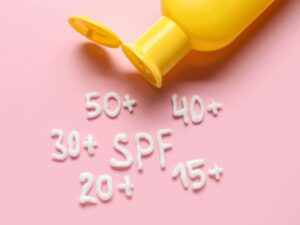
UVA rays, while less intense than UVB, penetrate the skin more deeply and are associated with aging and DNA damage. Broad-spectrum sunscreens are designed to protect against both UVA and UVB rays. It’s crucial for skincare brands to offer broad-spectrum formulations to meet consumer expectations and regulatory standards.
Choosing between chemical and physical sunscreens also impacts product development and consumer choice. Chemical sunscreens absorb UV rays and convert them into heat, while physical sunscreens reflect the rays away from the skin. Both have their own sets of pros and cons, influencing factors like texture, appearance on the skin, and potential for skin irritation.
2. Sunscreen Lotion: An In-depth Look
Sunscreen lotion is a creamy, often thick, formulation designed to provide a barrier against harmful UV rays. It typically contains a blend of both chemical and physical sun-blocking ingredients. Lotions are engineered to be water-resistant, and their viscosity makes them ideal for prolonged outdoor activities. They are often favored for their ease of measurement, ensuring that users apply the recommended amount for optimal protection.

Composition:
Emollients
These emollients help the sunscreen spread easily on the skin and also provide a moisturizing barrier, making the product more appealing to consumers with dry skin. For example, ingredients such as fatty acids, oils, and lipids are added to improve the product’s moisturizing effects.
Stabilizers
Sunscreen lotions often include stabilizers like octocrylene to extend the shelf life and efficacy of the active ingredients. These stabilizers ensure that the sunscreen maintains its UV protective qualities over time, even when exposed to light or heat.
Water Resistance
Polymers or film-forming agents are added to some formulations to make the product water-resistant. However, according to the American Academy of Dermatology, even water-resistant sunscreens require reapplication after a certain period, especially after sweating or swimming.
Antioxidants
Modern sunscreen lotions from Nako Cosmetic include antioxidants like vitamin E or green tea extract. These antioxidants provide additional protection against free radicals generated by UV exposure, enhancing the overall skin protection mechanism of the product.
Application Techniques:
- Generous Quantity: It’s important to use a sufficient amount of sunscreen lotion to cover all exposed areas of your skin. Using less than the recommended amount can significantly decrease the level of protection you receive.
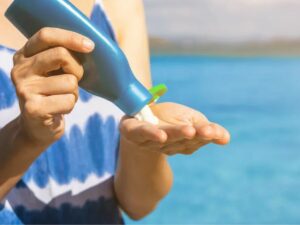
- Even Spread: Make sure to spread the lotion evenly over your skin. Uneven application can lead to areas of your skin being less protected, increasing the risk of sunburn or UV damage. Use long, gliding strokes to ensure uniform coverage.
- Circular Motion: Employ a circular motion when applying the lotion. This technique helps the product penetrate the skin more effectively and offers a more even application. The circular motion also aids in quick absorption.
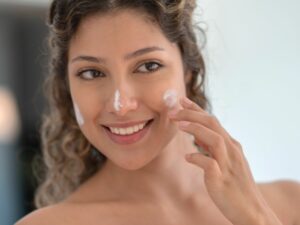
- Pay Attention to Details: Don’t neglect areas that are often overlooked, like the ears, back of the neck, and tops of the feet. These areas are equally susceptible to UV damage. Apply lotion meticulously to these parts to ensure comprehensive protection.
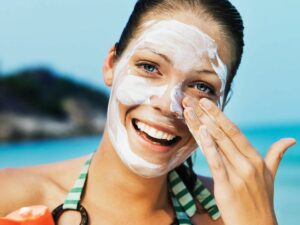
- Layering: If you are using other skincare products or makeup, sunscreen lotion should be the final layer to seal in protection. Apply it over your moisturizer and under your makeup. This ensures that sunscreen forms an effective barrier against UV rays.
- Timing: Aim to apply sunscreen lotion at least 15 minutes before you step out into the sun. This provides enough time for the skin to absorb the product and for it to start working. Late application may compromise the initial level of protection.
Pros and Cons
Pros:
- Sunscreen lotions offer precise measurement, ensuring adequate coverage.
- Their thicker formulation provides long-lasting protection, ideal for extended sun exposure.
- Lotions are often more moisturizing, benefiting those with dry skin.
- Lotions are versatile, easily incorporated into daily skincare routines.
- Many formulations are now reef-safe and environmentally friendly.
Cons:
- Lotions can feel greasy or heavy on the skin.
- They may leave a white cast, especially those with higher concentrations of physical blockers.
- Application can be time-consuming, which may deter some consumers.
- Some formulas may clog pores, posing a risk for those with sensitive or acne-prone skin.
- The need for frequent reapplication can make lotions less convenient for active or water-based activities.
3. Sunscreen Spray: An In-depth Look
Sunscreen spray is gaining momentum as a convenient alternative to traditional lotions. In this section, we’ll explore the power that this sunscreen can offer into your business decisions.

Description
Sunscreen spray is a liquid formulation packaged in aerosol or non-aerosol containers that dispense the product in a mist form. The spray allows for quick application, especially on hard-to-reach areas like the back. These formulations often use the same active ingredients as lotions but are designed for more lightweight, quick-absorbing coverage.
Composition
Aerosol Propellants
One distinguishing feature of some sunscreen sprays is the use of aerosol propellants like hydrocarbons to disperse the product as a fine mist. These propellants are a vital component that enables the quick and even application but have been under scrutiny for their environmental impact.
Solvents
Solvents like alcohol are often used in the formulation of sunscreen sprays to keep the active ingredients in solution. The presence of solvents allows for a lightweight, quick-drying finish, but may not be suitable for individuals with sensitive or dry skin.
Film-Forming Agents
To improve water resistance, film-forming polymers are frequently added to sunscreen sprays. These create a thin, invisible layer on the skin that helps to lock in the active ingredients, making the product more resilient to water and sweat.
Skin-Conditioning Agents
Sunscreen sprays may also include antioxidants like vitamin C and skin-conditioning agents like aloe vera to offer additional skin benefits. These supplementary ingredients can counteract free radicals and provide a level of hydration, respectively, improving the overall user experience.
Application Techniques
- Shake Well: Always shake the can before use to ensure the active ingredients are evenly distributed. From my experience, I can attest that failure to shake sunscreen well can result in uneven protection.
- Hold Close: Hold the canister about 4-6 inches away from the skin for a more concentrated application. Spraying from a greater distance may result in a less effective layer of protection.
[image 8]
- Sweep Motion: Use a sweeping motion to apply the product evenly across the skin surface. Short, quick bursts are less effective and can result in uneven coverage.
- Don’t Spray Directly on Face: It’s recommended to spray the sunscreen onto your hands first and then apply it to the face. This prevents inhalation of the product and ensures more accurate application in delicate areas.
- Reapply Frequently: Due to its lighter formulation, sunscreen spray often requires more frequent reapplication, especially after swimming or sweating.

- Indoor Application: It’s better to apply sunscreen spray in a well-ventilated area or outdoors to avoid inhaling the product, which can be harmful.
Pros and Cons
Pros
- Sunscreen sprays offer quick and convenient applications, ideal for on-the-go usage.
- The lightweight formulation is less likely to feel greasy or heavy on the skin.
- Sprays can easily cover hard-to-reach areas, making them user-friendly.
- The aerosol or non-aerosol packaging is often more portable than bulky lotion bottles.
- Suitable for people who prefer not to touch their skin, reducing the risk of contamination.
Cons
- The risk of inhalation poses an additional safety concern, particularly for children.
- Environmental impact of aerosol cans is a growing concern among eco-conscious consumers.
- The quick-drying nature of sprays can make it challenging to know if you’ve applied enough for effective protection.
4. Comparative Analysis: Lotion vs Spray
In the realm of sun protection, the debate between sunscreen lotions and sprays continues to be a topic of discussion among consumers and industry leaders alike. Let’s have a closer look at its differentiations:

Efficacy
- Sunscreen Lotion: Lotions thicker consistency, results in a reliable and uniform layer of protection against both UVA and UVB rays. Lotions are less likely to be applied unevenly, thereby reducing the risk of missed spots and providing comprehensive UV protection.
- Sunscreen Spray: Sprays offer a convenient, quick-drying application but run the risk of uneven coverage. Mist application is prone to gaps and may not adhere to the skin as effectively as lotions.
User Experience
- Sunscreen Lotion: Lotions tend to be more moisturizing, which is beneficial for dry or sensitive skin. However, they can feel heavier and greasier, potentially leading to discomfort during extended wear, particularly in hot or humid conditions.
- Sunscreen Spray: According to Mirchi Plus, sprays offer a lightweight feel and quicker drying time, making them popular for on-the-go applications. However, they are not recommended for reapplication on windy conditions or precision application, such as on the face.
Ingredients
- Sunscreen Lotion: Lotions often include moisturizing ingredients like glycerin or hyaluronic acid, providing added skincare benefits. However, they can also contain allergens like fragrances or preservatives, which may not be suitable for sensitive skin types.
- Sunscreen Spray: Sprays often contain a high proportion of volatile alcohols to facilitate quick drying. While effective, these ingredients can dry the skin and are generally less suitable for dry or sensitive skin types.
Versatility
- Sunscreen Lotion: Lotions can be used on both the face and body, and are often available in formulations suitable for various skin types. Nako Cosmetic’s sunscreen lotions also provide a stable base for layering with other skincare products, such as moisturizers.
- Sunscreen Spray: Sprays are incredibly versatile for body application and are often favored for quick reapplication, especially during outdoor activities. Take note that their suitability for facial application is limited, often requiring a separate facial sunscreen product.
5. 4 Factors to Consider When Choosing Between Sunscreen Lotion or Spray
Selecting the right form of sun protection can be a complex decision. For businesses in the skincare sector, they need to understand these considerations to guide their customers effectively, such as:
#1 Skin Type
Lotions are often more hydrating, making them suitable for dry or sensitive skin. Sprays, for example, containing solvents like alcohol may not be ideal for sensitive skin. However, for oily or acne-prone skin, the lightweight formulation of sprays may be more comfortable. Understanding the skin types of your target demographic can inform product development and marketing strategies.
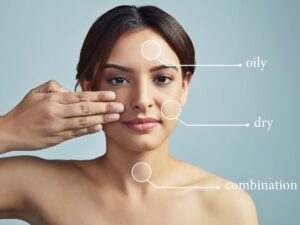
#2 Precision of Application
The level of control needed during application can influence the choice between lotion and spray. Lotions allow for precise application, making them ideal for areas that require special attention. Sprays may not offer the same level of control, and there’s a risk of missing spots or uneven coverage. For businesses, offering a range of products with varying levels of application control can cater to diverse customer needs.
#3 Frequency of Reapplication
The need for frequent reapplication can also sway the choice between lotion and spray. Lotions often have a longer-lasting effect, especially water-resistant variants, reducing the need for reapplication. Sprays may require more frequent reapplication, particularly after swimming, as they are often less water-resistant. It is important to take note that this factor can impact the overall cost-effectiveness of the product.
| Aspect |
Sunscreen Lotion |
Sunscreen Spray |
| Longevity |
Lotions often have a longer-lasting effect on the skin. |
Sprays may not last as long as lotions. |
| Water Resistance |
Many lotions are water-resistant, making them ideal for activities like swimming. |
Sprays are often less water-resistant, requiring reapplication after water activities. |
| Reapplication Frequency |
Less frequent reapplication is needed, especially with water-resistant variants. |
More frequent reapplication may be required, especially after swimming or sweating. |
| Cost-Effectiveness |
Less frequent reapplication might mean using less product over time, potentially offering better value. |
More frequent reapplication could lead to using up the product faster, impacting its cost-effectiveness. |
| Convenience |
Applying lotion might take more time and effort, especially in hard-to-reach areas. |
Sprays can be quicker to apply and can easily cover hard-to-reach areas. |
#4 Environmental Concerns
Consumers are increasingly focused on the environmental impact of their choices. Lotions often come in more sustainable packaging options like recyclable tubes or bottles. Sprays, especially aerosol types, have environmental concerns related to their propellants. Businesses should consider these factors, as eco-conscious branding and product design can significantly influence consumer preference and loyalty.
Dive Deeper Into Our Resources
Looking for more diverse product options? Browse through our handpicked selections:
Still haven’t found what you’re looking for? Don’t hesitate to contact us. We’re available around the clock to assist you.
Conclusion
For businesses in the skincare and cosmetic industries, understanding the unique characteristics of different types of sunscreen is essential. This guide equips you with the insights needed to make informed choices, whether you’re formulating new products or advising customers.
Discover how Nako Cosmetic can elevate your sun protection offerings with their extensive range of quality lotions and sprays. For customized solutions tailored to your business needs, contact us today to learn more.








